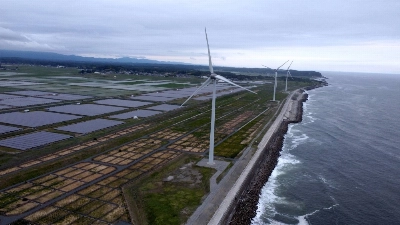It’s 4 a.m., pitch black and drizzling as Yasuhiro Otomo steers his small fishing boat and crew of four — all clad from head to toe in waterproof gear — out into Ishinomaki Bay where his fishing nets are set, waiting to be hauled aboard.
A resident of Higashimatsushima, Miyagi Prefecture, Otomo comes from a long lineage of fishermen and has over 20 years’ experience navigating the waters off the Hamaichi coast.
“This may be one of the last times we go out this season,” Otomo says as he explains that the onset of the warmer summer months usually brings an end to the sea bass fishing season.
“I used to focus on salmon fishing, but starting around five years ago, the salmon catch has decreased dramatically.”
Otomo attributes the cause of these plummeting numbers to climate change, which has pushed the Kuroshio Current — a warm ocean current on the west side of the North Pacific Ocean basin — about 500 kilometers further north by his estimation. “Salmon favor cold waters, and as long as the warm currents persist, they will not return to our coasts.”
The collapse in salmon numbers is just one of the ways in which Otomo has experienced unprecedented change to the local environment — changes which led him to engage more with his local community, spreading awareness about fishing practices and the impacts of climate change.
However, it was only upon reconnecting with another Higashimatsushima resident, Miku Narisawa, in 2021 that it was decided to give the communication efforts a more structured approach. Together, they joined forces to found Odyssey, an educational organization that provides children with nature-based programs that revolve around activities such as fishing and farming.
During a typical day at Odyssey, participants — who can vary from elementary school students to adults — start by contemplating nature in silence and honing their senses as they practice skills such as nature-based navigation, fire-making and cooking. The idea is that interacting with nature will foster an ability to think critically about current socioenvironmental issues and, eventually, the skills to act upon this awareness.
“When I was growing up, planting rice was a family activity which brought us all together,” says Narisawa. “Farming taught me the value of natural resources and nature as a tool for humans to communicate.”
Narisawa is a Ph.D. student in marine environmental anthropology at Tohoku University’s Graduate School of Environmental Studies. She is investigating the reciprocal relationship between the natural world and the identities of people living in coastal areas. Her mission with Odyssey is to help children experience the natural environment that surrounds them, just as she was able to as a child.
Yet, Narisawa’s relationship with nature hasn’t always been an easy one. When she was only 12 years old, the 2011 Great East Japan Earthquake and subsequent tsunami engulfed her hometown and upended her community. She only survived the tsunami by taking refuge on her elementary school’s top floor. The loss of her home and damage to her community changed her perception of the ocean drastically and was also a determining factor in her decision to study the concept of environmental peacebuilding in Europe and then the United States.
“After experiencing the tsunami, I realized that the Earth is breathing and that as humans we must try to understand and adapt to its natural pace,” she says. “There is a growing distance between nature and young generations and, when it comes to natural disasters and climate change, it is important that we grow up understanding what is going on with our environment and how we interact with it.”
For Narisawa, a key component to understanding this reciprocal relationship is contained in the concept of satoumi, which describes coastal areas where biological productivity and biodiversity have increased through human interaction in a mutually beneficial relationship.
In Higashimatsushima, an example of this concept plays out in nori (seaweed) farming, an important staple crop of the local economy.
“Nori relies on precious nutrients such as nitrogen, phosphorus and potassium, which flow into the sea via rivers,” explains Futoshi Aizawa, a third-generation nori farmer and collaborator with Odyssey’s educational projects. “The ocean acts as a mirror for the wellbeing of coastal ecosystems and communities.”
Japan’s nori productivity is approximately 60% of what it was 20 years ago. Aizawa says this is because poor land and forest management, as well as unsustainable human activities which have led to global warming and rising sea water temperatures, have reduced the flow of nutrients into the sea and hence made it harder for nori to grow in coastal areas. Case in point: Tokyo Bay, where massive land reclamation and development projects pushed out nori farmers from what was once the nation’s largest center for nori production.
For Otomo and Narisawa, it is important that Odyssey’s educational programs reveal these deep interconnections that characterize coastal ecosystems. However, this is not done in classrooms but through experiences where children engage with nature on their own terms and make their own choices without adult interference.
“Nature can be a source of play and knowledge. Taking children out into the ocean or rice fields and allowing them to make their own decisions, whatever these may be, helps them develop the ability to think for themselves,” says Narisawa. “As we face a growing environmental crisis, future generations need to be equipped with true leadership skills and confidence so that they can take action and adapt to a world where natural disasters and climate change will be ever more common.”

























With your current subscription plan you can comment on stories. However, before writing your first comment, please create a display name in the Profile section of your subscriber account page.